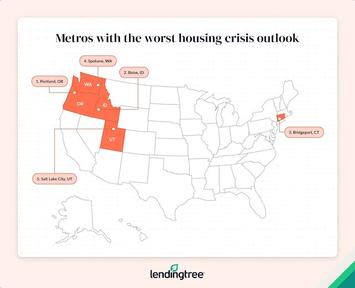
Portland, Oregon is suffering from the “worst housing crisis outlook” in the country, according to a study published last week by LendingTree.com. The study compared housing prices with household incomes and current vacancy rates to conclude that Portland and three other cities in the Northwest — Boise, Spokane, and Salt Lake — are four of the five worst housing markets out of the top 100 metro areas.
While I appreciate anything that knocks Portland, I have a lot of quibbles with this study. The researcher used data for metropolitan areas, which are political units (being drawn on county boundaries), instead of urban areas, which are economic units (being drawn based on population densities). The researcher compared median housing prices with median household incomes, while median family incomes make more sense because non-family households (such as college housemates) rarely buy homes.
The numbers in the study are based on an average for the five years from 2019 through 2023. Those five years were tumultuous enough that any data from the beginning of that period no longer has any validity. I would have used just 2023 data, which are available for all 100 areas in the study.
A bigger problem is that the researcher apparently gave equal weight to the home price-to-income ratio and vacancy rate (percentage of housing units that are unoccupied). In reality, a high vacancy rate doesn’t mean much if the typical vacant house costs eight times typical household or family incomes. Median prices in Los Angeles, San Francisco, and San Jose are all well over eight times median household incomes, but the study ranks them as better off than Portland, where prices are “only” 5.5 times median household incomes.
San Jose’s vacancy rate of 5.56 percent is only 17 percent higher than Portland’s 4.76 percent, yet the former’s price-to-income ratio of 8.53 is 53 percent higher than Portland’s 5.57. This makes San Jose’s housing market much worse than Portland’s.
As I say, these are quibbles. Both San Jose’s and Portland’s housing markets are in terrible shape and neither community should be proud to be among the worst in the country.
The Lending Tree study concludes by advising people to “shop around” when seeking to buy a home, to “get your credit in order” before going shopping, and to keep an “emergency fund” to deal with maintenance and repairs after buying a home. These insipid ideas are blindingly obvious, are valid whether or not housing is unaffordable, and will do nothing to make housing more affordable.
This is my biggest problem with the study: it treats unaffordable housing as something that “just happened” independent of state or regional land-use policies. In fact, it took years of hard work on the part of lobbyists and special interest groups to destroy the housing markets of the urban areas where about 40 percent of Americans live.
Read the rest of this piece at The Antiplanner.
Randal O'Toole, the Antiplanner, is a policy analyst with nearly 50 years of experience reviewing transportation and land-use plans and the author of The Best-Laid Plans: How Government Planning Harms Your Quality of Life, Your Pocketbook, and Your Future.
Graphic: courtesy the Antiplanner












